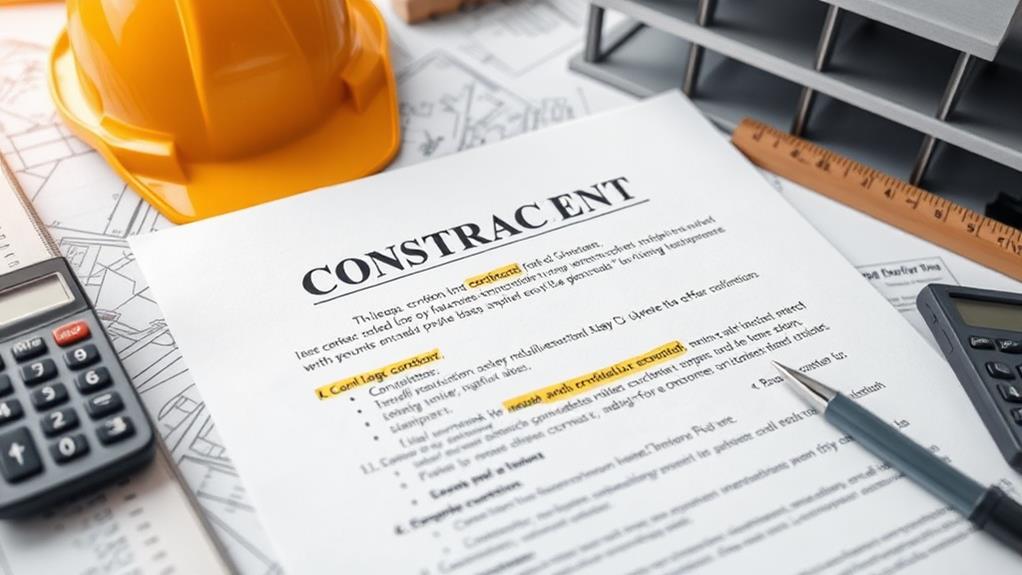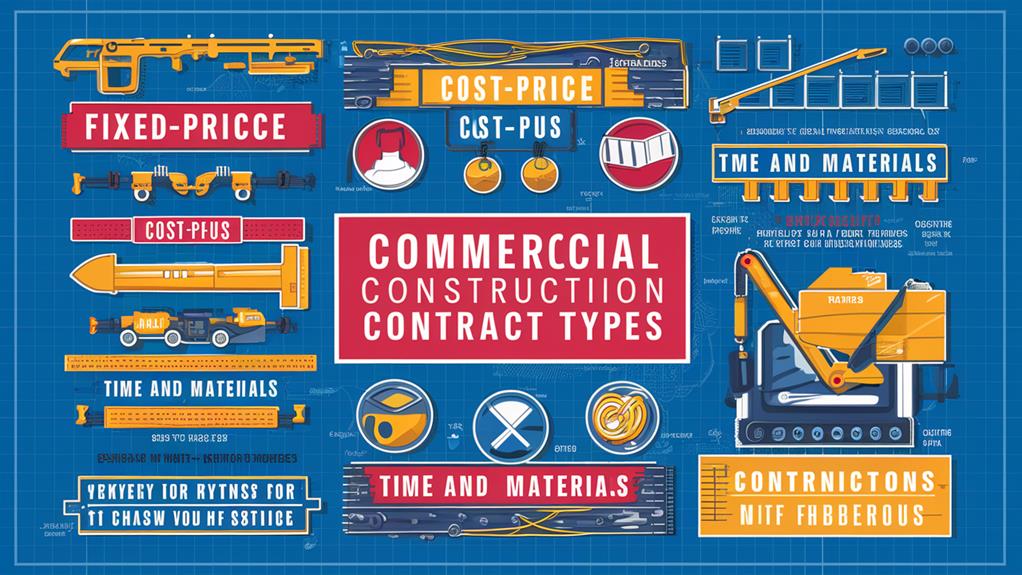Understanding commercial construction contract types is crucial for any project. These contracts outline project scope, payment terms, and timelines, reducing misunderstandings. The main types include Lump Sum, Cost Plus, Time and Materials, Unit Price, and Design-Build contracts. Lump Sum contracts have a fixed price, while Cost Plus reimburses expenses plus fees, allowing flexibility. Design-Build integrates design and construction, enhancing collaboration. Each type has its own advantages and risks, so knowing which suits your project best can help avoid conflicts. Stay informed about these agreements, and you'll be better equipped for successful project outcomes. More insights await you just ahead.
Overview of Commercial Construction Contracts

When you dive into commercial construction contracts, you're looking at legally binding agreements that play a crucial role in project management. These contracts outline the project scope, payment terms, and project timelines, ensuring everyone knows their responsibilities. By defining these elements clearly, you can reduce misunderstandings and potential disputes.
A well-structured contract can significantly enhance project outcomes and align with the industry's commitment to innovation and quality craftsmanship.
There are different types of commercial construction contracts, like lump sum contracts, time and materials contracts, unit price contracts, and cost-plus contracts. Each type serves specific needs and incorporates various risk management strategies. For instance, lump sum contracts provide a fixed price, while time and materials contracts charge based on actual labor and materials used.
Understanding these options helps you choose the best contract for your project. By addressing payment sums and project schedules, you establish a framework that keeps the project on track.
Remember, clear definitions of responsibilities of parties involved are essential for smooth operations. In a world where many project owners cite contractor underperformance, a comprehensive contract can significantly enhance project outcomes.
With effective commercial construction contracts, you can navigate the complexities of construction projects with confidence, ensuring a successful execution.
Essential Components of Construction Contracts
Understanding the essential components of construction contracts is vital for ensuring a successful project. First, you need a clear definition of the project's scope. This prevents ambiguities that can lead to disputes or misunderstandings later on.
Additionally, effective project management is crucial for maintaining smooth execution from start to finish, which can be directly impacted by how well the contract is structured. Next, detailed project schedules with timelines and specified delivery dates are essential, so everyone understands the expected milestones and completion dates.
You must also outline the total payment sum within the contract. Lack of clarity here can lead to payment disputes and financial disagreements.
Additionally, provisions for handling changes and delays, including change orders and delay clauses, are critical to address unforeseen circumstances that may impact the project.
Don't forget to include indemnification clauses. These protect parties from legal claims during construction, ensuring responsibilities and liabilities are clearly defined. This clarity helps prevent disputes as the project progresses.
Types of Commercial Construction Contracts

What type of commercial construction contract suits your project best? There are several types of construction contracts you can choose from, and each has its own benefits and challenges.
A Lump Sum contract provides a fixed total price for the entire project, making it ideal for well-defined scopes of work. However, it can pose risks for contractors if unexpected costs arise. With a commitment to innovation and quality in urban development, understanding these contract types can help ensure successful project outcomes.
If your project has uncertain elements, consider a Cost Plus contract. This type reimburses contractors for actual expenses plus a fee, allowing flexibility but requiring careful tracking of total project costs.
Then there's the Time and Materials contract, which charges based on the actual time spent and materials used. While it offers adaptability, it can lead to higher costs for you as the project owner if not closely monitored.
Another option is the Unit Price contract, which divides the work into units with set prices.
Lastly, the Design-Build contract combines design and construction under one agreement, enhancing collaboration and reducing disputes but often resulting in higher initial costs.
Understanding these options helps you make an informed decision about the right contract for your project's scope of work.
Design-Build Vs Traditional Contracts
Navigating the choice between design-build and traditional contracts can significantly impact your project's success. A design-build contract combines the design and construction phases under a single agreement. This means construction can start before finalizing the design, helping to reduce project timelines.
In contrast, traditional contracts require completed designs before any building begins, which often leads to separate agreements for design and construction. This separation can create conflicts and delays.
With design-build contracts, you'll benefit from streamlined communication and collaboration between designers and contractors. This teamwork often leads to innovative solutions and cost savings.
Additionally, if your project requires flexibility and adaptability, a design-build contract is particularly advantageous. It allows for concurrent processing rather than a linear approach, enhancing overall project efficiency.
On the other hand, traditional contracts can sometimes result in adversarial relationships due to the separation of responsibilities. This division may increase the likelihood of disputes and project delays.
Ultimately, understanding the differences in contract terms between these two approaches will help you make an informed decision that suits your project's needs.
Common Issues in Construction Contracts

In construction, contracts can often become a source of tension and conflict if not handled correctly. One common issue arises from ambiguities in contract language, which can lead to misunderstandings and disputes. This often results in project delays and increased costs you'd want to avoid.
When it comes to liability, indemnification clauses must be clearly defined; poorly drafted clauses might unexpectedly shift financial responsibility between the owner and contractor.
Another issue is the scope of work. Incomplete descriptions within this provision can create confusion or even fraud, making it essential to provide comprehensive details in contracts.
Additionally, if you don't include provisions for handling changes and delays, you could face legal issues regarding project modifications.
To minimize these potential disputes, regular monitoring and documentation are crucial. Keeping track of contract performance, particularly regarding cost overruns and scope changes, can help you identify issues early and resolve them before they escalate into serious problems.
Risk Management in Construction Contracts
Effective risk management in construction contracts hinges on clear communication and thorough documentation among all parties. To minimize disputes, it's essential to create comprehensive contracts that define the project scope, timelines, and payment provisions. This clarity helps reduce risks related to cost overruns and delays, allowing everyone to stay on the same page.
Monitoring contract performance closely is vital. If changes arise in the project scope or unexpected expenses occur, addressing these issues promptly can prevent disputes. Indemnification clauses must be carefully drafted as well, protecting all parties from potential legal claims during construction. Ambiguities can lead to shifted liability, increasing risk exposure.
Using risk-sharing contracts, like Integrated Project Delivery contracts, fosters collaboration among stakeholders. By promoting teamwork, these contracts distribute risks more evenly and encourage innovative solutions.
When everyone understands their responsibilities and communicates effectively, the project is more likely to succeed.
Conclusion
In conclusion, understanding commercial construction contract types is crucial for successful projects. Did you know that nearly 70% of construction disputes arise from contract misunderstandings? By knowing the essential components and different contract types, you can help prevent these issues. Whether you choose a design-build or traditional contract, being informed empowers you to make better decisions. Always remember to prioritize risk management, as it's key to a smoother construction process and a successful outcome.


Leave a Reply